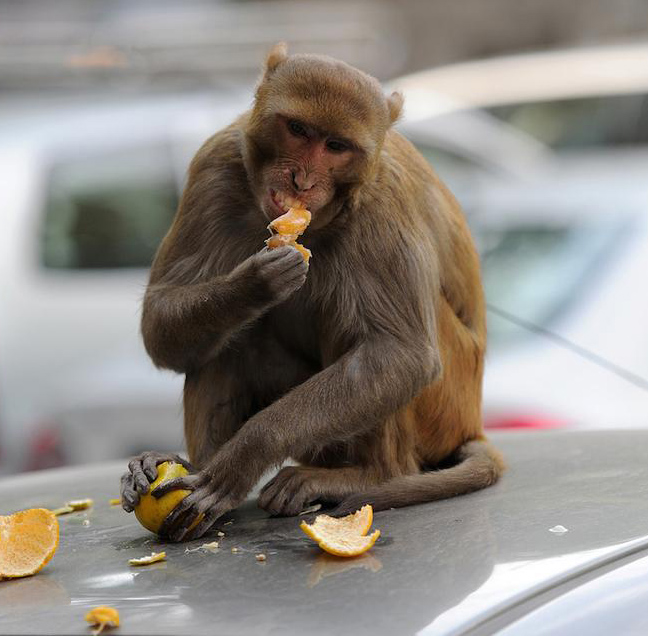Monkeys rule in India
Monkey menace is quite common in many parts of India, where they snatch items from people and sometimes trespass into homes in search of food. Red-faced rhesus macaques have spread havoc, snatching food and mobile telephones, breaking into homes and terrorizing people in and around the Indian capital. They have colonized areas around parliament and the sites of key ministries, from the prime minister’s office to the finance and defense ministries, frightening both civil servants and the public. “Very often they snatch food from people as they are walking, and sometimes they even tear files and documents by climbing in through the windows,” said Ragini Sharma, a home ministry employee. Ahead of Tuesday’s start of parliament’s winter session, an advisory to members of parliament last month detailed ways they could keep simian attacks at bay. Don’t tease or make direct eye contact with a monkey, the advisory said, and definitely don’t get between a mother and her infant.
Recently, a monkey snatched the eyeglasses off a district Judge in Mathura’s Vrindavan. A video of the incident shows the judge and several policemen gathered under a building and figuring out a way to retrieve the glasses. Some monkeys can also be spotted jumping around the building. After keeping the men on their toes for some time, the monkey finally gives back the glasses. In many parts of India, they steal things from people and occasionally trespass into homes in quest of food. One such video going viral on social media shows a monkey stealing things from a woman’s handbag and running away. The humorous video starts off with a monkey unzipping a bag that had been set down by a person. It opens the main zipper as if it’s looking inside the bag for something, after which it opens a second zipper, takes an apple from inside, and flees away. One user wrote, “All monkeys are thieves. They have become used to being fed by humans and lose their sense of fear,” said Sengupta, of the Ashoka Trust for Research in Ecology and the Environment. Hundreds of macaques feasting on optic fiber cables strung along the banks of the river Ganges derailed the plan to roll out internet in this constituency.
Monkeys have bred rapidly in Delhi and neighboring states as they have protected status, but there is no official estimate of their numbers. Authorities stumbled on a partially successful solution four years ago, after hiring 40 men to disguise themselves as langurs (larger monkeys and predators) and squeal monkey-like to try and terrify the macaques away. “We call them ‘ape repellers’ and they are contract employees,” said a government official, who asked not to be identified. The stratagem works temporarily as the monkeys flee on hearing the calls, but they return once the men depart. Primatologist S.M. Mohnot recommends sterilization and moving the animals to forests, as well as lifting a ban on their capture for biomedical research and resuming exports of the macaques, as components of a solution.
Monkeying around
The inventor of auto correct died today.
His funnel is next monkey.
Who answers the computer support lines in India?
Americans
Wal-Mart announced plans to open its first retail stores in India. Tags on clothes and stickers on items will read, “Made Here.”
Social distancing never worked in India because…
by the time you are 6 feet away from one, you will be too close to another person.
October 4th Birthdays
1989 – Melissa Benoist, 1990 – Dakota Johnson, 1977 – Alicia Silverstone, 1994 – Yeonmi Park
1989 – Derek Rose, 1958 – Bill Faggerbakke, 1998 – Dale Whibley, 1987 – Michael Roman



